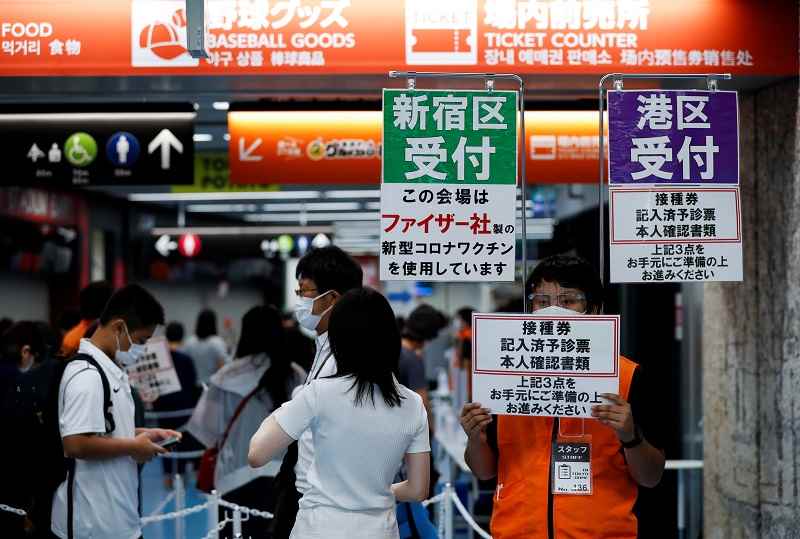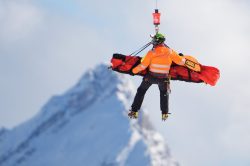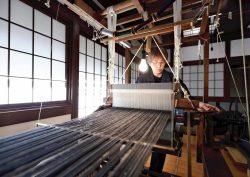Review, improve measures after lifting state of emergency / Expand inoculations to boost economy

A staff member wearing a protective face mask and shield, guides people at the Tokyo Dome, the home ground of the Japanese professional baseball team Yomiuri Giants which is being used as a large-scale coronavirus disease (COVID-19) vaccination center, in Tokyo, Japan, August 16, 2021.
14:20 JST, May 29, 2022
The fifth wave of novel coronavirus infections, the worst so far in Japan, is approaching its end. It is essential to comprehensively take stock of problematic points with the measures taken against the pandemic so far and establish a new system to prevent a widespread resurgence in infections.
Prime Minister Yoshihide Suga has decided to lift the coronavirus-related state of emergency now in effect in 19 prefectures, along with less-strict priority measures in place in eight other prefectures.
New infections have decreased by more than 80% compared to three weeks ago, and the shortage of hospital beds is beginning to ease. Lifting the state of emergency can be called appropriate.
Vaccinate young people
Speaking at a press conference, Suga emphasized the need for vaccinations and the augmentation of the healthcare system. “From now on, it is important to assume the existence of the virus and to balance infection control and daily life while preparing for the next wave,” Suga said.
Next week, Suga will step down and a new cabinet will be formed. It is imperative to examine the problems with current anti-coronavirus measures and then work swiftly to deter a sixth wave of infections under the new prime minister.
It will be the first time in six months for a state of emergency and priority measures to be lifted nationwide.
Measures against the virus will be relaxed in stages, and restaurants and bars will continue to be asked to shorten their business hours at the discretion of prefectural governors. For events at which large numbers of people gather, an attendance cap of 10,000 will be requested.
The challenge now is to suitably resume the social and economic activities that have been stagnant. In doing so, preventing the spread of infection will be the top priority. If infections continue to spread, restrictions on human behavior cannot be eased and the brakes on economic activity will remain.
For this reason as well, thorough vaccinations are necessary. It has already been shown that vaccines are highly effective, and anti-coronavirus measures have entered a new phase.
Nearly 60% of Japan’s population has received two doses of vaccine, and vaccines have been observed to be effective in reducing the risk of serious COVID-19 symptoms and death.
However, the vaccination rate for people in their 20s and 30s is only in the 30% range.
This is due partly to the fact that there are still many municipalities, especially in the Tokyo metropolitan area, where residents cannot easily make appointments for vaccinations even if they want to. When the Tokyo metropolitan government set up an inoculation venue for young people that did not require reservations, lines formed from early in the morning.
Many people in their 40s and 50s are also still not vaccinated. Nonetheless, the government said it will start the third round of vaccinations for people aged 65 and older after the beginning of next year.
The central and local governments need to improve on issues that have prevented vaccinations from proceeding smoothly in the past, such as speeding up vaccine distribution, securing personnel and venues, and promoting input into the vaccination record system. They should work with medical professionals to resolve these issues.
More hospital beds needed
During the fifth wave, there were a number of cases in which infected people could not be hospitalized and died at home. There is an urgent need for the central government, local governments and medical institutions to work together to establish a system that can secure hospital beds in a flexible manner.
In particular, it is essential to secure sites and personnel, so as to be able to increase the number of temporary medical institutions and overnight care facilities when infections surge. Medical personnel who can be dispatched should be registered in advance, and progress should be made with the planning of deployment and training.
Even though the Tokyo metropolitan government had reserved a certain number of hospital beds for COVID-19 patients, once about 60% of the beds had been filled, it became difficult to get patients admitted.
Some hospitals are said to have been reluctant to accept COVID patients, despite receiving government subsidies. It is essential to take measures to improve the situation, such as surveying and publicizing the actual status of patient acceptance at hospitals.
It is time to draw on wisdom on how to resume social and economic activities based on the increase in vaccination rates.
The government said it will conduct a real world trial of a so-called “vaccine and testing package” program that utilizes vaccination certificates and certificates indicating a negative virus test. It is important to quickly confirm the effectiveness of the program in deterring infections and to clarify specific guidelines for easing behavioral restrictions.
Use certificates properly
Experts should analyze the factors that led to the decrease in the number of infected people in the fifth wave, and recommend infection prevention measures that are acceptable to the public without excessive restrictions on their behavior.
When introducing the program, it must be ensured that people who cannot be vaccinated due mostly to pre-existing conditions or allergies are not discriminated against. It is important to consider such measures as making PCR testing free for eligible people.
It is expected that an oral drug for COVID-19 will be commercialized overseas as early as this year. If this becomes a reality, it will be possible to prevent people from becoming seriously ill while going about their daily lives. Domestic and foreign pharmaceutical companies are conducting clinical trials for such drugs in Japan as well. The government is encouraged to provide active support for their development.
— The original Japanese article appeared in The Yomiuri Shimbun on Sept. 29, 2021.
Top Articles in Society
-

Man Infected with Measles May Have Come in Contact with Many People in Tokyo, Went to Store, Restaurant Around When Symptoms Emerged
-

Woman with Measles Visited Hospital in Tokyo Multiple Times Before Being Diagnosed with Disease
-

Australian Woman Dies After Mishap on Ski Lift in Nagano Prefecture
-

Foreign Snowboarder in Serious Condition After Hanging in Midair from Chairlift in Nagano Prefecture
-

Record-Breaking Snow Cripples Public Transport in Hokkaido; 7,000 People Stay Overnight at New Chitose Airport
JN ACCESS RANKING
-

Japan Institute to Use Domestic Commercial Optical Lattice Clock to Set Japan Standard Time
-

Israeli Ambassador to Japan Speaks about Japan’s Role in the Reconstruction of Gaza
-

Man Infected with Measles May Have Come in Contact with Many People in Tokyo, Went to Store, Restaurant Around When Symptoms Emerged
-

Prudential Life Insurance Plans to Fully Compensate for Damages Caused by Fraudulent Actions Without Waiting for Third-Party Committee Review
-

Woman with Measles Visited Hospital in Tokyo Multiple Times Before Being Diagnosed with Disease























